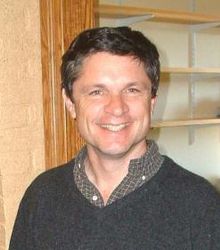
Summary
Andrew Eben Strominger (/ˈstrɑːmɪndʒər/;[1] born 1955) is an American theoretical physicist who is the director of Harvard's Center for the Fundamental Laws of Nature. He has made significant contributions to quantum gravity and string theory. These include his work on Calabi–Yau compactification and topology change in string theory, and on the stringy origin of black hole entropy. He is a senior fellow at the Society of Fellows, and is the Gwill E. York Professor of Physics.
Andrew E. Strominger | |
|---|---|
 Andy Strominger at Harvard | |
| Born | July 30, 1955 |
| Citizenship | US |
| Alma mater | Harvard College (AB, 1977) University of California, Berkeley (MA, 1979) MIT (PhD, 1982) |
| Known for | CGHS model Contributions to: String theory Quantum gravity dS/CFT correspondence Kerr/CFT correspondence SYZ conjecture S-brane |
| Awards | Breakthrough Prize in Fundamental Physics (2017) Klein Medal (2014) Dirac Medal (2014) Dannie Heineman Prize (2016) Guggenheim Fellowship (2020) |
| Scientific career | |
| Fields | Physics |
| Institutions | University of California, Santa Barbara Harvard University |
| Thesis | The large symmetry approximation in quantum field theory (1981) |
| Doctoral advisor | Roman Jackiw |
| Doctoral students | |
Education edit
Strominger received his bachelor's degree at Harvard College in 1977 and his master's degree at the University of California, Berkeley. He then received his PhD at MIT in 1982 under the supervision of Roman Jackiw. Prior to joining Harvard as a professor in 1997, he held a faculty position at the University of California, Santa Barbara. He is the author of over 200 publications.
Research edit
Notable contributions edit
- a paper with Cumrun Vafa that explains the microscopic origin of the black hole entropy, originally calculated thermodynamically by Stephen Hawking and Jacob Bekenstein, from string theory[2]
- a paper with Philip Candelas, Gary Horowitz, and Edward Witten in the 1980s about the relevance of Calabi–Yau manifolds for obtaining the Standard Model from string theory
- other articles discussing the dS/CFT correspondence and the Kerr/CFT correspondence (variations of the AdS/CFT correspondence)
- S-branes (a variation of D-branes)
- OM-theory (with Shiraz Minwalla and Nathan Seiberg)
- noncommutative solitons (with Anastasia Volovich, Shiraz Minwalla and Rajesh Gopakumar)
- massless black holes in the form of wrapped D3-branes that regulate the physics of a conifold and allow topology change
- the SYZ conjecture, an interpretation of mirror symmetry as a special case of T-duality (with Eric Zaslow and Shing-Tung Yau)
- purely cubic action for string field theory
- superstrings with torsion
- a study of the relationship between asymptotic symmetries in asymptotically flat spacetimes, soft theorems and memory effects
- an analytic calculation of the exact spectrum of gravitational wave emission from extreme mass ratio inspirals (EMRIs) into rapidly rotating black holes (these gravitational waves are expected to be detected with future space-based gravitational wave detectors such as eLISA)
Awards edit
In recognition of his accomplishments, Strominger has been awarded numerous prizes, fellowships, and honorary professorships. These include the Klein Medal from the Royal Swedish Academy of Sciences, the 2008 Eisenbud Prize from the American Mathematical Society, the 2014 Dirac Medal from the Abdus Salam International Centre for Theoretical Physics, which he received for his contributions to the origin, development, and further understanding of string theory, and the 2017 Breakthrough Prize in Fundamental Physics with Cumrun Vafa and Joseph Polchinski. In 2020, he received a Guggenheim Fellowship.[3]
See also edit
References edit
External links edit
- Home page of Strominger at Harvard
- Harvard Physics Department Newsletter, fall 2015 describing the Strominger group's research (pp. 21–25)
- Strominger's articles in the INSPIRE-HEP database


